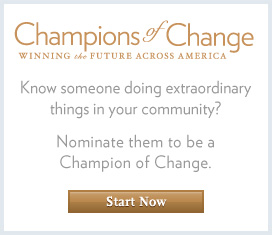Champions of Change Blog
Taking ‘Made in the USA’ to the Next Level
Posted by on June 6, 2013 at 4:36 PM EDT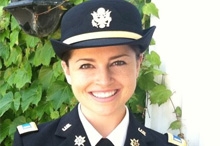
Emily Núñez is being honored as a Champion of Change for her accomplishments as a crowdfunding pioneer.
Sword & Plough is a social enterprise that helps employ veterans by repurposing military surplus material into stylish bags and accessories. Its mission is to empower veteran employment, reduce waste, and strengthen civil-military relations.
Sword & Plough was founded in 2012. Returning to Middlebury College after spending the summer attending the U.S. Army Airborne School, I cultivated the initial idea for Sword & Plough through close work with Middlebury’s Center for Social Entrepreneurship. Since then, Sword & Plough has participated in the Dell Social Innovation Lab, won first place and the Audience Choice Award at the Harvard Pitch for Change Competition, and pitched on the floor of the New York Stock Exchange during the Kairos Global Summit. We launched our first pre-order sales through the crowdfunding platform Kickstarter. Our team aimed to raise $20,000 in 30 days and greatly surpassed our goal with a final total of $312,000 raised through 1,553 backers. Our success through crowdfunding has enabled us to produce our first round of bags, recycle 10,000 pounds of military surplus, and truly kick-start our social enterprise.
As one of three Army ROTC cadets studying in the bucolic setting of Middlebury College and commuting to the University of Vermont for training, I sometimes found it difficult to relate my military commitment to my fellow classmates, many of whom had never met someone who served in the military. My sister and Co-Founder, Betsy, and I wanted to create something that would emotionally and physically touch civilians in their everyday lives and remind them, in a beautiful way, of the challenges our country and servicemembers face, and the power that every person has to help.
After listening to Jacqueline Novogratz from Acumen Fund speak at Middlebury College’s Social Entrepreneurship Symposium, I thought to myself, “What in my life is routinely discarded that could be harnessed and repurposed into something meaningful, with a powerful story?” Having grown up in a military family and being familiar with the requisite gear, unserviceable military surplus material immediately came to mind.
Bags, which almost every person uses throughout his or her day, seemed like the perfect product. After developing the initial idea, we realized there was positive impact to be achieved beyond recycling and connecting civilians with the military population. We could also directly empower veteran employment by working with veterans to sew our products. As our mission took shape, we began to see that we were creating a quadruple bottom line business that emphasized people, purpose, planet, and profit through our work with American veterans. In this way, our bags are rugged, refined, and relevant.
More than one million veterans are projected to leave the military in the next four years, and the crisis of veteran unemployment is projected to grow as a result. Sword & Plough aims to help solve this problem by working with manufacturers that employ veterans and by generating employment opportunities for retired service members. Our goal is to help veterans transition into civilian life by finding meaningful employment and a sense of purpose.
Sword & Plough also conserves resources. The materials used to make our bags would otherwise be burned or buried in a landfill, but we enable a beautiful and socially beneficial second life for the canvas and nylon fabrics we recycle. Sword & Plough is projected to upcycle 30,000 pounds of military surplus within its first year of commercial operation.
Sword & Plough’s progress is a testament to the power of the growing infrastructure to support student entrepreneurship. Without the momentum provided by competitions, fellowships, and mentoring programs, my “light bulb moment” may have been only that. It is largely due to the guidance and encouragement of our Board of Advisors that we have been able to succeed.
I am incredibly grateful to have been invited to the White House as a Champion of Change and to be recognized for the work that we are doing, which has been empowered by crowdfunding. It is our hope that our mission continues to spread across the nation. The most gratifying aspect of leading and launching Sword & Plough is the ability to create a community that is as passionate about supporting veterans as we are.
Emily Núñez is CEO and Co-Founder of Sword & Plough.
Learn more about Economy, TechnologyCrowdfunding Medical Treatment for People in Need
Posted by on June 6, 2013 at 4:29 PM EDT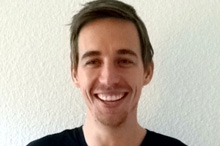
Chase Adam is being honored as a Champion of Change for his accomplishments as a crowdfunding pioneer.
I was sitting in the back of a bus in a small village in Costa Rica called Watsi. A woman in tattered clothing was standing in the aisle in front. She was holding a red folder and speaking to the passengers near her. I thought she must be selling stickers or skin creams.
A few minutes later I looked up and found she was making her way down the aisle toward me. She was holding a plastic bag, and although she had only passed a few passengers, the bag was bursting with money. I couldn’t believe it. In my year and a half in the Peace Corps, I had never seen a bus salesperson earn so much.
When she reached me, I still had no idea what she was selling. Then the man next to me asked to see the red folder she was holding.
The instant she opened the folder, everything came together. There was a photograph on one side and a document on the other. The photograph showed a young boy with an incision across the width of his stomach. The document described his medical condition. The young boy was her son.
In that moment I had what can only be described as an epiphany. If I could somehow connect this woman with my friends and family back home, she would have the money to pay for her son’s medical treatment within the day.
As a result of that experience on the bus, I decided to create a global crowdfunding platform for healthcare called Watsi, named after the town I was traveling through at the time. On Watsi, anyone would be able to donate as little as $5 to directly fund low-cost, high-impact medical care for people in need.
After a year and a half of working on Watsi, our team launched the platform to the public in August of 2012. Within hours of launching, an online technology forum called Hacker News had driven more than 15,000 people to our site. All of the patients posted on our site had their medical treatments funded within hours, and we received hundreds of emails from people around the world who were interested in what we were doing.
Since the day of the launch, Watsi has grown quickly. We’ve been featured in the media by outlets like the New York Times, Forbes, and the Wall Street Journal; we’ve entered and won numerous social innovation competitions; and most recently, we were the first non-profit to be accepted into Y Combinator, a prestigious investment program in Silicon Valley that has incubated some of the fastest-growing internet companies of all time. We have also managed to raise some operating capital, and we are now three full time staff living and working in the Bay Area—just a stone’s throw away from the offices of technology giants like Google, Facebook, and Apple.
We are both humbled and surprised by the amount of support we have received. But without a doubt our greatest success so far is having told the stories of the first four hundred patients who have had their medical treatments funded on Watsi.
We believe that technology is fundamentally changing the face of international development. Aid is no longer an anonymous exchange of resources between two unknown groups of people. Instead, technology is making it easier than ever to bring people together. And by connecting people in a meaningful way, we think it is possible to solve some of the world’s greatest challenges.
Chase Adam is Co-Founder of Watsi.
Learn more about Economy, TechnologyMore Than a Bookstore
Posted by on June 6, 2013 at 4:22 PM EDT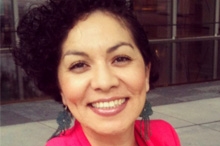
Aurora Anaya-Cerda is being honored as a Champion of Change for her accomplishments as a crowdfunding pioneer.
My mom instilled in me a passion for reading, and in books I discovered many worlds. She taught me that education was the door to opportunities and no one could take that away from me.
La Casa Azul Bookstore is a reflection of who I am as an artist and entrepreneur, and my goal to feature Latino/Chicano writers. One of the reasons why I decided to open La Casa Azul Bookstore was because Chicana/o literature was critical in my own education and identity.
Growing up, I read everything I could get my hands on—from cereal boxes, to magazines and comics. When I discovered Chicana/o writers like Sandra Cisneros and Rudolfo Anaya, I connected to their stories and began seeking out more books that reflected my identity and experience. By then I was already in high school and I wished I had read about them earlier!
The idea to open La Casa Azul Bookstore had been brewing for many years before the grand opening in 2012. I signed up for my first business course in 2006—not knowing what the future would hold, the experiences I would have, and the places I would visit in planning for the bookstore’s opening. Looking back at those six years of planning and research, I am thankful for the lessons I learned, the people I met, and the challenges I overcame. Those years reminded me of the importance of patience, and taught me that determination and persistence are important for any dream to become a reality.
In the Fall of 2011, I launched a crowdfunding campaign after banks and agencies declined my loan application for the fourth year in a row. By then I had been running an online bookstore and hosting events throughout New York. I took the leap of faith and launched the “40K in 40 days” campaign, which brought together over 500 bookstore fans and supporters that saw the need for La Casa Azul Bookstore to exist. With their financial support, La Casa Azul Bookstore became a reality, opening its doors on June 1, 2012. Contributions to the “40K in 40 days” campaign came from all over the country and from as far away as Australia, London, and South Korea. Funders sent messages like: “Every community needs a bookstore”; “I grew up in East Harlem, I wish La Casa Azul Bookstore existed for me”; and “Reading saved my life.”
East Harlem has embraced La Casa Azul Bookstore,. making us much more than your average retail store by being the literature hub in the neighborhood. We serve as the “third place,” a community meeting space. Since opening the store a year ago, we have held over 200 events including book clubs, author signings, gallery shows, film screenings, writer’s conferences, and workshops.
We have neighbors, educators, tourists, and many local artists visit the bookstore. Once, Sonia Manzano stopped by to purchase a book, while her cab waited outside to take her to the airport. We also had a surprise visit by Junot Díaz. That is what is great about being in a city that is home to many great writers—you never know who will stop by!
I am honored to be a part of the White House Champions of Change, and am forever thankful to the funders of the “40K in 40 days” campaign, who believed in the power of community, in La Casa Azul Bookstore, and in me.
Aurora Anaya-Cerda is Founder of La Casa Azul Bookstore.
Learn more about Economy, TechnologyE Pluribus Unum
Posted by on June 6, 2013 at 4:10 PM EDT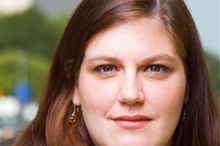
Andrea Seabrook is being honored as a Champion of Change for her accomplishments as a crowdfunding pioneer.
Among the most inspiring facets of the American experiment is our belief in the power of individuals, banding together for the collective good. “We, The People” power our democracy, build our communities, and choose our future. Crowdfunding is the next logical extension of that most American of values. That is why I chose to crowdfund DecodeDC, my new public radio show and podcast, using Kickstarter.
Crowdfunding is more than just a new way to start a business. It’s a way to start a movement. When you appeal directly to people, and they contribute their hard-earned money to your project, you are building an audience that is truly invested in your work, both literally and figuratively. And that, I believe, is exactly what journalism needs right now.
After years of covering politics and government, I have come to believe that Washington is broken, and the way the media covers it is partly to blame. Our institutions seem to produce the exact opposite of their intended purpose: Campaigns narrow choices. Advocacy blocks progress. Elections protect politicians. But news outlets continue to cover these things as if they were functioning well.
DecodeDC covers Washington differently. We approach the problems with stark honesty and fierce independence. We ask why politics is broken, and search for answers. We try to be the eyes and ears of our listeners, wondering about the state of our democracy. It is what I deeply believe our society needs right now, and it is what our audience and funders demand.
Crowdfunding works. My audience was generous and I raised more money than I thought was possible using crowdfunding. But I also gained much more than that—I made myself and DecodeDC directly accountable to our listeners; exactly the people a journalist should be accountable to.
Andrea Seabrook is Host and Founder of DecodeDC.
Learn more about Economy, TechnologyMaking Detroit Better, One Soup at a Time
Posted by on June 6, 2013 at 3:53 PM EDT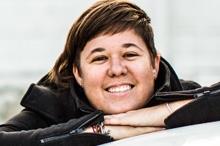
Amy Kaherl is being honored as a Champion of Change for her accomplishments as a crowdfunding pioneer.
Every month, about 300 Detroiters each pay $5 for soup, salad, bread, and a vote to support a creative local project for social change. The music is exciting, the lights are dim, and people sit on the floor around old doors and boards that are converted into temporary tables. We are ready to listen to, and collaborate with, people who want to make Detroit better—from a 12-year-old boy who wants a clean park next to his school, to a 40-year-old woman who wants to help others learn financial literacy. The opportunities are open for anything to happen!
Through Detroit SOUP, neighbors have given neighbors over $27,000 for projects related to urban agriculture, art, social justice, entrepreneurship, technology, and education. It’s pretty amazing to watch people gather together, listen to these presenters in total silence, and then eat, share, and vote together.
SOUP has a natural way of connecting people. We are meeting to have a shared experience. People can bump elbows sitting next to one another on the floor, stand a little less awkwardly in line together, and talk about what project they think would best benefit from their $5. We have watched friendships made, jobs found, resources shared, projects find new collaborators, and even a couple meet and marry.
We share works of art from fellow Detroiters to explore and engage others. We want the ideas of participation, art in the everyday, and civic engagement to resonate in our work. The people are the power and the dinner is the act of what we know is good: giving to one another, listening, asking questions, participating together, engaging in conversations about how to make things better, and practicing our role in democracy. Multiple races, ethnicities, religions, and philosophies gather together. We get to vote our ideals, and might end up changed or challenged in the process.
The project is simple. In a world where many things seem polished and perfect, we aim to create a space where we acknowledge the imperfect. We are exploring and navigating what a new Detroit can look like, and SOUP acts as a catalyst to provide an opportunity to know what people are thinking on the ground level. There is something magical about Detroiters that breeds friendliness and challenges those who have their ego ahead of the progress of the city. We’re all in this thing together, and we seem to know that on a very real level.
Starting your own dinner in your own city can be easy. There are a few resources available. First, head to sundaysoup.org and see if there is a dinner already happening within your city. You will also find information on how to start your own Soup program.
Amy Kaherl is Director of Detroit SOUP.
Learn more about Economy, TechnologyCrowdfunding Microloans for Social Good
Posted by on June 6, 2013 at 3:30 PM EDT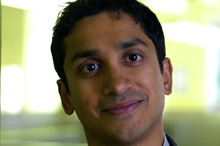
Premal Shah is being honored as a Champion of Change for his accomplishments as a crowdfunding pioneer.
How can we leverage crowdfunding to create abundance where there is scarcity? How do we give everyone a way to consistently be their best selves, including maximizing their potential to do good for others? The capacity and will is there, we see it when our country and the world comes together to assist after major disasters. How can that hope, compassion, and connection—that fundamental understanding that we are a human family—continue to flow long after disasters, and help to build a sustainable economic recovery for all of us?
Those are some of the guiding questions we ask ourselves everyday at Kiva.org.
Almost eight years ago, Kiva launched a global experiment to crowdfund microloans to help alleviate poverty and expand economic opportunity. We leveraged every new technology we could get our hands on to bring crowdfunding and microlending into the mainstream.
Today, more than one million budding small business entrepreneurs in 30 U.S. cities and 65 countries have received loans crowdfunded on Kiva.org. In total, more than $440 million in loans have been crowdfunded by a global community of 940,000 people lending $25 at a time to the entrepreneur of their choice. And with a 98% repayment rate, the money you lend is truly a loan, not a donation—proof of a compelling mission and a sustainable model.
Kiva Zip is a new innovation from Kiva poised to dramatically expand access to small business microloans in the U.S. by leveraging new technologies and the power of crowdfunding. Kiva Zip aims to reach entrepreneurs who are locked out of traditional loan programs and entrepreneurs using their small businesses to advance social good in their communities.
Small businesses are the cornerstone of the nation’s economy and a stepping stone to the American Dream. According to the U.S. Small Business Administration, they represent more than 99% of all businesses in the country and create two out of every three net new jobs. Despite the economic power of small businesses, the credit freeze of 2008 has not thawed for the smallest of small businesses. Small business owners and budding entrepreneurs are denied loans for any number of reasons: the loan amount they seek is too small, their business is too young, their plan is too innovative, or their credit history is too short or damaged. What they do have is the passion, plan and people in their community who know and trust them.
The lending institutions built to assist them are struggling to meet demand. There are just 400 microlending organizations in the U.S., with only 2% of potential small business owners being served. However, there are millions of community groups, religious communities, and individuals with deep community ties, who can transform social capital into financial capital on Kiva Zip.
Through Kiva Zip, these groups do not have to create their own loan programs. Instead, they can become Kiva Zip Trustees and vouch for the small business owners and budding entrepreneurs who they know and trust. Once endorsed, entrepreneurs can post their profile and begin getting their 0% interest loan crowdfunded by friends, neighbors, and Kiva’s global community of lenders.
Over time, successful Kiva Zip borrowers are themselves becoming Trustees, endorsing other aspiring entrepreneurs who they trust in their community. As these trust networks virally spread, the reach of Kiva Zip’s 0% interest, crowdfunded capital can dramatically expand the availability of microloans in the U.S.
Operating for just one year in pilot phase, Kiva Zip is already opening doors to opportunity for hundreds of small business owners and aspiring entrepreneurs across the country. Over 150 organizations and individuals in 30 states have become Trustees, including the Institute for Veterans and Military Families in New York and the City of Oakland in California.
More than half the U.S. loans crowdfunded on Kiva Zip are to entrepreneurs in their first year of operation, and about one-third have been startups. These entrepreneurs have been financially excluded or are creating a positive social impact in their neighborhoods and communities—exactly the types of businesses that can help create a sustainable economic recovery consisting of local jobs.
Today, seven out of ten small businesses’ loans are rejected by traditional lenders, but with access to crowdfunded “gap financing” from the internet community, many more of these businesses will be able to survive, create jobs, and ultimately qualify for loans from traditional lenders as their businesses succeed.
The crowdfunding movement has proven that when traditional lenders step back, millions of everyday people are willing to step up to become “Champions of Change” in their own communities.
Premal Shah is President and Co-Founder of Kiva.org.
Learn more about Economy, Technology
- &lsaquo previous
- …
- 64
- 65
- 66
- 67
- 68
- 69
- 70
- 71
- 72
- …
- next &rsaquo

